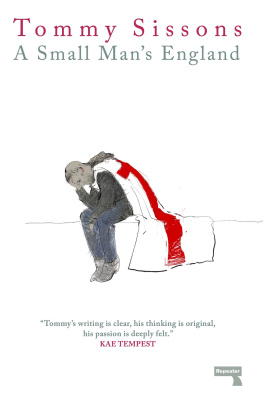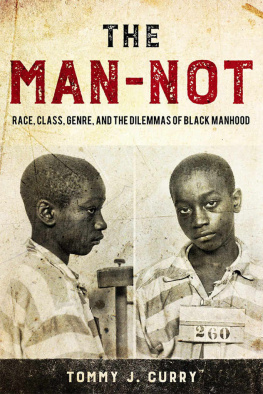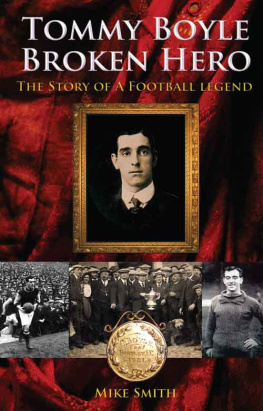Tommy Sissons - A Small Mans England
Here you can read online Tommy Sissons - A Small Mans England full text of the book (entire story) in english for free. Download pdf and epub, get meaning, cover and reviews about this ebook. year: 2020, publisher: Watkins Media, genre: Politics. Description of the work, (preface) as well as reviews are available. Best literature library LitArk.com created for fans of good reading and offers a wide selection of genres:
Romance novel
Science fiction
Adventure
Detective
Science
History
Home and family
Prose
Art
Politics
Computer
Non-fiction
Religion
Business
Children
Humor
Choose a favorite category and find really read worthwhile books. Enjoy immersion in the world of imagination, feel the emotions of the characters or learn something new for yourself, make an fascinating discovery.
- Book:A Small Mans England
- Author:
- Publisher:Watkins Media
- Genre:
- Year:2020
- Rating:3 / 5
- Favourites:Add to favourites
- Your mark:
- 60
- 1
- 2
- 3
- 4
- 5
A Small Mans England: summary, description and annotation
We offer to read an annotation, description, summary or preface (depends on what the author of the book "A Small Mans England" wrote himself). If you haven't found the necessary information about the book — write in the comments, we will try to find it.
A Small Mans England — read online for free the complete book (whole text) full work
Below is the text of the book, divided by pages. System saving the place of the last page read, allows you to conveniently read the book "A Small Mans England" online for free, without having to search again every time where you left off. Put a bookmark, and you can go to the page where you finished reading at any time.
Font size:
Interval:
Bookmark:


Published by Repeater Books
An imprint of Watkins Media Ltd
Unit 11 Shepperton House
89-93 Shepperton Road
London
N1 3DF
United Kingdom
www.repeaterbooks.com
A Repeater Books paperback original 2021
Distributed in the United States by Random House, Inc., New York.
Copyright Tommy Sissons 2021
Tommy Sissons asserts the moral right to be identified as the author of this work.
Cover design: Johnny Bull
ISBN: 9781912248926
Ebook ISBN: 9781913462284
All rights reserved. No part of this publication may be reproduced, stored in a retrieval system, or transmitted, in any form or by any means, electronic, mechanical, photocopying, recording or otherwise, without the prior permission of the publishers.
This book is sold subject to the condition that it shall not, by way of trade or otherwise, be lent, re-sold, hired out or otherwise circulated without the publishers prior consent in any form of binding or cover other than that in which it is published and without a similar condition including this condition being imposed on the subsequent purchaser.
Printed and bound in the United Kingdom by TJ International Ltd
The most thoughtful intervention on white working-class masculinity Ive come across in a long time. The author advances a compelling vision of what we can be. I felt addressed throughout.
J OE G LENTON , AUTHOR OF S OLDIER B OX : W HY I W ONT R ETURN TO THE W AR ON T ERROR
In times of revolution the voices from below find the gaps so they can speak. Tommy Sissons is a rare voice exploring white working-class masculinity in these turbulent times. He looks through the cracks opening and shouts listen, so please do.
LISA M C K ENZIE , A UTHOR OF G ETTING B Y : E STATES , C LASS AND C ULTURE IN A USTERITY B RITAIN
Tommys writing is clear, his thinking is original, his passion is deeply felt. Hes always moved me as poet, and now as a writer of prose I find him carefully considered, strong in his morals and aware of the complexities within the subjects he discusses.
K AE T EMPEST , POET AND AUTHOR OF T HE B RICKS THAT B UILT THE H OUSES
Contents
Foreword
Before beginning a book like this, it is important to state clearly its purpose and ambition. Critics of all political persuasions must be aware of my convictions. I am a socialist and Labour Party member. I am an advocate of pluralist democracy and celebrate the diverse cultures brought to this country by people of colour and those of different nationalities. I stand in support of the struggles for equality of all oppressed demographics. I have a keen interest in a time in England (before I was born) in which class consciousness was commonplace and the working class was proud to be so. This is an England that seems hauntingly distant to me, as a twenty-four-year-old raised in a country scarred by neoliberalism. My hope is for us, as working-class people of all ethnic groups, to create a new sense of class consciousness and push, with this, for equality together. Thus I wish to utilise the unifying traditions of the socialist working class and deploy them in a progressive and polyethnic society.
In recent years, the term white working class has become associated with right-wing politics. This is alarming. The vast majority of the white working class, in my experience, is welcoming to those of different ethnicities. I surround myself with white working-class people of only this description. I have, on the other hand, met many white working-class English men throughout my life who have been tempted towards the right and far-right, and these are men I believe it is important to examine. The right and far-right use them and, whilst the men in question must adopt individual responsibility, it is right to investigate what roles class, masculinity and nationality play within the neoliberal landscape. This book is a study of all three of these concepts.
A critical thinker, in my opinion, must be ready to address the faults of their own camp as well as that of the enemy. Therefore, throughout this book I will readily critique the flaws of the Labour Party and the wider left, as well as those of the true opposition of the working class: the Conservative Party, far-right organisations and capitalists. This is a polemic aimed at the right-wing and the oppressive forces that ceaselessly maintain power in England, and have done so for centuries. It aims to encourage the replacement of the current capitalist, systemically racist England and the confused and isolated white working-class masculine notion of the Small Mans England with a Common England, which can represent all.
Whilst it is obvious that rich white men have held the nation and, indeed, the whole Western world in a chokehold for far too long, I find it shocking that texts discussing exclusively white working-class English masculinity are so few and far between, and conversations on the topic so readily shunned. As there is a limited input from white working-class men in the worlds of academia and contemporary literature, I feel my contribution to be timely and appropriate.
This book is composed of a number of essays interspersed with brief fictional segments.
London, 2020
There is a problem in contemporary Britain which remains largely unexplored for reasons of fear, for reasons of shame and for reasons of guilt. This problem is that of the political leaning of the white working-class English man towards the right and the far-right. As I write, on the final breath of the decade, fascism is rearing its ugly head across the continent, and those who are most obviously beguiled by it, who are following its deceptive and wicked call to destruction and misery, are white working-class men. In England, these are men who share a socioeconomic background marred by poverty and often earn below the national average wage. They populate the council estates, the crumbling terraced houses, the temporary accommodation and the insecure rented properties of intemperate landlords common in every county.
In an age in which wealthy white men are rightly being held accountable for their domination of the West and their stranglehold on society, the white working-class English man is, for numerous reasons, swept under the rug and rarely discussed by many on the modern left. Such individuals, who may be uncomfortable with the concepts of patriotism or masculinity, will commonly regard him as too awkward to mention. Others may consider him as undeserving of attention due to the societal privileges of the average white male. He may be an oppressor himself, or complicit in the oppression faced by people of colour in a systemically racist England. All of these are complex points. This is why the white working-class man is so important to scrutinise and, although many working-class men of all races share similar experiences and opinions, it is for this reason that this book predominantly focuses on white men.
There is very little statistical data kept on the white working-class man, as he is often represented solely by the umbrella demographic of White British, which also, of course, includes men who are far wealthier and of far greater power. Thus, some may think that the white working-class English man is more successful in education, employment and economic capital than he is in reality. However, he is also in the eyes of many the fascist at the rally or the football hooligan in the pub. He is, therefore, seen in contradictory ways making him difficult for those outside of his demographic to place. He is commonly the grotesque antagonist ridiculed by the mainstream media. He acts as an excuse for the middle class and the wealthy to justify their historic classism. He is a figure that has, indeed, been caricatured for centuries. This man is valued, in many cases, by neither the right nor some branches of the contemporary left.
Next pageFont size:
Interval:
Bookmark:
Similar books «A Small Mans England»
Look at similar books to A Small Mans England. We have selected literature similar in name and meaning in the hope of providing readers with more options to find new, interesting, not yet read works.
Discussion, reviews of the book A Small Mans England and just readers' own opinions. Leave your comments, write what you think about the work, its meaning or the main characters. Specify what exactly you liked and what you didn't like, and why you think so.













